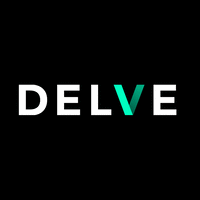Tell us about your journey into technology. What made you start DELVE?
I started DELVE in 2008, when I was 34 yrs old; I am now 44. I’ve always found the idea of controlling my own destiny really appealing. From my early twenties, I’d thought about building my own company. I wanted the freedom to choose where I live with my wife and daughters at any point throughout my career. It seemed to me at the time, that if I were to own a business, then I would, in fact, have that full control over where exactly we would settle, and that has turned out to be the case. For example, two years ago I moved the company to Boulder, CO, after living in NYC for 15 years — I love that I can make that type of decision for my family. That sense of ownership over the future is one reason why I love working at DELVE.
In fact, that desire to always be facing forward is why we built DELVE to be the kind of business that it is. We wanted to be a company that always has one eye on the future, especially when it comes to the technologies that are shaping our industry. It’s clear that automation, through AI and Machine Learning, will have an enormous impact on the future of Digital Marketing. I wanted to build a business that’s prepared to make the most of that future and help our clients to do the same. That’s why Google Marketing Cloud sits at the center of what we do at DELVE, because by mastering the best tools we’ve positioned ourselves to master that future.
What are the core tenets of your data activation model? How does DELVE add value to digital media transformation journeys for businesses?
You’ve probably heard the phrase “data is currency,” and at DELVE we really believe it. There’s a strongly held belief in the strategy and marketing consulting industry that a firm that owns its own data and can manage or “activate” that data will be in a position to beat the competition. We share that belief and we’re proceeding accordingly.
We believe that one big reason that data activation was been so elusive in the past is that moving data between silos has been either difficult or impossible. However, throughout 2018 and entering 2019, it is becoming easier than ever before to connect a brand’s call center, brick and mortar store, and website data, to things like review and reputation data, cancellation rates at the customer level and lifetime value data from a CRM system. Once you’re able to pull all of these things together, as we now are, a unified view on the customer is finally possible.
We add value because we aren’t just connecting the dots between a brand’s various data sets; more importantly, we are able to envision the types of actions that a brand will want to take with its data 3 or 24 months into the future, and then walk backward and design a ‘data activation roadmap’ that’s actually actionable.
That ability to translate data or technology investments into clear tangible value is what truly sets up apart.
How do you measure the performance of your Marketing Analytics and sales reporting?
Ultimately, the purpose of any analytics, measurement or reporting is to either eliminate waste or identify new opportunities. For most clients, eliminating waste is where we start. It’s the best way to immediately add value early on in an engagement. The dollars we save on waste can come in handy down the road when we start to surface those new opportunities I mentioned.
Often, the question that we are trying to answer is about proper media allocation. How much should a brand be investing in TV, Radio, Direct Mail or Digital? These are big, hairy, multi-million dollar questions. We utilize a variety of attribution models, ranging from very simple to highly complex, in order to help brands understand not just ROI, but the incrementality around those investments. For instance, retargeting in display makes sense, but how much should a brand invest in display to retarget, and how incremental are those transactions? How many of them would have happened anyway?
We believe that reporting precedes action — we have to know where we are now in order to take the next step. However, reporting is only valuable if it leads to changes in how a brand operates, and as a digital consultancy, our goal is to advise brands and walk them through that digital transformation process.
What are the benefits of leveraging Google Cloud platform for site-side analytics and campaign management? How does DELVE empower companies better churn these benefits?
The key benefit of Google Cloud is moving beyond averages. Many brands still don’t understand their audience’s “sweet spot.” Brands know that they have to attract the ‘best’ customers with their value proposition, but executing on that vision is challenging.
Google Cloud was built to answer a variety of business questions, but we find that Google Cloud shines when it comes to answering marketing questions because Google has one of the best cross-device user graphs. Cross-device user identification is built into Google Cloud through a product called AdsDataHub. This means that we can look at the whole customer journey — from a visit, to the initial purchase, to a subsequent store visit or phone call, all the way to a cancelled order.
With Google Cloud, we can see which customers are true fans, and which customers will buy one time and never again.
That means that we can then help steer a brand towards its audience “sweet spot,” and help them to focus on specific target segments or clusters of consumers. All of this translates into higher return on advertising spend, and increased revenue growth.
Which marketing and sales leaders do you follow or interact with regularly to stay on top of your business?
Honestly, I don’t follow any marketing and sales leaders, at least not closely. I do pay attention to innovators though. People like Richard Branson or Elon Musk. I admire people who have the ambition to take on an entire industry even when it means facing formidable odds, and who’ve succeeded in the process. I also identify, in my own, scaled-down way, with the pain that these people have gone through, or in the case of Elon Musk, are going through. I often feel consumed by my passion to grow DELVE, and I feel a kinship with anyone who is passionate about their work.
What are your predictions on the most impactful disruptions in website automation and visitor intelligence data?
We are moving towards a world where “assistance” is more common — what Google is doing with suggested responses in Gmail is an example of smart assistance that can save time by bringing automation to some of the rote parts of communications. It seems minor, but it’s freeing up time and focus for more high-level tasks.
The challenge for any system that will be able to automatically suggest a different UX based on visitor intelligence data is complexity. If I have to connect two different systems (e.g., one that does intelligence or rule gathering, and one that serves different site experiences), then there’s an exponentially greater chance of failure. Any system with two or more variables is logarithmically more complex than a system with just one variable.
My prediction is that companies like Google, which offer both intelligence around the value of a cookie in Google Analytics 360, and the ability to act on those insights in Optimize 360, are going to win. Not because they are necessarily “better” at technology, but because they provide a one-stop solution for intelligence and execution.
Which startups in the technology industry are you watching keenly right now?
I am always curious about startups such as Heap or Optimove, which either try to simply tag or drive toward assistance. In the case of Heap, it’s about doing a better job at tagging than Google Tag Manager. In the case of Optimove, it’s about taking on all the major Email Service Providers (ESPs), by re-inventing what it means to do Email Marketing.
I’m also a huge fan of Google Marketing Platform. I believe that Google provides the best adtech on the market, but I also believe that competition is healthy. A level playing field and plenty of options for building a tech stack are ultimately going to produce the best results by driving true differentiation in terms of their tech offerings.
What Marketing and Sales automation tools and technologies do you currently use?
We are a Google Marketing Platform partner, and that’s the only technology that we use on brand projects. In terms of both depth of data and ease of use, there’s really no comparable tools on the market. The data that Google has access to is simply unsurpassed. The ability to move that user data, or those audiences, for variety of applications is very attractive.
With the Google Marketing Platform, we can worry less about technology, and more about generating and activating insights, especially in Paid Search and Display, Video or Native.
Could you tell us about an outstanding digital campaign? (Who was your target audience and how did you measure success?)
One campaign that I’m particularly proud of is the one we recently launched for our travel client, BookIt.com.
We were able to find audiences that were looking for all-inclusive Caribbean vacations within a relatively short (and urgent) time period. Because we could mine data in Google Analytics 360 and Google Cloud, we were able to then activate those insights in Search Ads 360 (formerly DoubleClick Search) or Display and Video 360 (formerly DoubleClick Bid Manager).
How do you prepare for an AI-centric world as a business leader?
We see our investment in Google Cloud as our best preparation for the rise of AI. It’s not likely that we can develop our own ML or AI technology to rival what’s being offered by Google. However, we see a huge opportunity in harnessing existing algorithms to help brands grow. The opportunity for us is around advising brands on how ML can propel them forward.
How do you inspire your people to work with technology?
To answer that, I think it’s important to answer a larger question: How does one inspire people, period?
I believe that we are all seeking to improve ourselves and to be better today than we were yesterday.
I tell my team at DELVE that I would like to support their professional growth in such a way that, if they choose, they will find it easy to leave the company. After all, if they have a great skill set, they will be able to get a job anywhere. I know that sounds a little bit crazy, but I follow up by letting my team know that I sincerely want to be sure that DELVE is an attractive place for them to work, both in terms of opportunities and rewards — and that our teammates will choose to stay and continue to develop professionally at DELVE.
I believe that the best way to inspire people is to help them grow and to ensure that our firm offers greater growth opportunities than they could find anywhere else.
One word that best describes how you work.
Passionately.
What apps/software/tools can’t you live without?
What’s your smartest work-related shortcut or productivity hack?
Do one thing at a time, and do it well.
What are you currently reading? (What do you read, and how do you consume information?)
This will sound cliche, but right now I’m reading the latest Blue Ocean Strategy book, “Blue Ocean Shift.” I feel it’s very important that we, as marketers, consistently think about how to reinvent ourselves to remain relevant to the brands that rely on us for insight.
What’s the best advice you’ve ever received?
“Doing is as important as thinking.”
I’m a huge fan of planning and road mapping a process. But I also know that planning is just hoping. When launching a new initiative, I find that just moving and executing toward a pre-defined goal is just as, if not more, important than meticulous planning.
Something you do better than others — the secret of your success?
I work very hard, and I am not afraid to take action with limited information. I wouldn’t call hard work and willingness to take chances a “secret sauce” — it’s just something that has worked for me.
Tag the one person (or more) in the industry whose answers to these questions you would love to read:
Elon Musk. I love that he… works hard and takes action in uncertain situations. 🙂
Thank you, Greg! That was fun and hope to see you back on MarTech Series soon.
Greg Sobiech launched DELVE in 2008 with one goal: to build a team that could activate data and maximize his clients’ ROI. Nearly ten years later, his 30-person firm prides itself on the skills and the mastery of digital tools needed to help clients make the most of the data revolution.
 DELVE is a top-rated Google Marketing Platform Partner and one of Inc5000’s fastest-growing companies.
DELVE is a top-rated Google Marketing Platform Partner and one of Inc5000’s fastest-growing companies.
DELVE is your strategic partner for site-side analytics, campaign management, and advanced marketing science. As experts in the Google Marketing Platform and Google Cloud Platform, DELVE drives client growth through a data-driven mindset that converts digital inefficiency into hard ROI.
We achieve this by taking our technology seriously: every data point is an opportunity to inform stronger media decisions for your brand through cutting edge solutioning and envelope pushing execution, which means data integrity and data accuracy aren’t just buzzwords at DELVE — they’re step number one.
And through rigorous measurement and expert media management, we transform your data into an actionable marketing strategy that helps you exceed your goals. Stronger insight and smarter spending: DELVE helps you win greater marketplace dominance, improve customer acquisition, and increase return through the power of honest marketing data.
The MTS Martech Interview Series is a fun Q&A style chat which we really enjoy doing with martech leaders. With inspiration from Lifehacker’s How I work interviews, the MarTech Series Interviews follows a two part format On Marketing Technology, and This Is How I Work. The format was chosen because when we decided to start an interview series with the biggest and brightest minds in martech – we wanted to get insight into two areas … one – their ideas on marketing tech and two – insights into the philosophy and methods that make these leaders tick.











